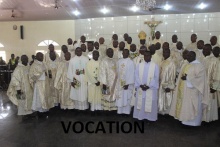There is a restlessness in the soul that comes from the Holy Spirit and another that comes from an unclean conscience, Pope Francis said today at morning Mass in the Casa Santa Marta.
According to Vatican Radio, the Pope spoke of this good and bad anxiety, drawing from the account of Herod’s state after he killed John the Baptist:
The Gospel of the day describes King Herod (Antipas) as being perplexed or anxious because, having had John the Baptist killed, he now felt threatened by Jesus. He was worried just as his father, Herod the Great, was troubled after the visit of the Magi. There can be two different kinds of anxiety in the soul, the Holy Father said, a “good” anxiety, which “the Holy Spirit gives us” and which “makes the soul restless to do good things”; and a “bad” anxiety, “that which is born from a dirty conscience.” The two Herods tried to resolve their anxiety by killing, going forward over “the bodies of the people”:
These people who had done such evil, who do evil and have a dirty conscience and cannot live in peace, because they live with a continual itch, with a continual rash that does not leave them in peace… These people have done evil, but evil always has the same root, any evil: greed, vanity, and pride. And all three do not leave the conscience in peace; all three do not allow the healthy restlessness of the Holy Spirit to enter, but bring you to live like this: anxiously, with fear. Greed, vanity, and pride are the roots of all evils.
Vanity, the osteoporosis of the soul
The day’s first Reading, taken from Ecclesiastes, speaks about vanity:
The vanity that makes us swell up. The vanity that does not have long life, because it is like a soap bubble. The vanity that does not give us true gain. What profit comes to the person for all the effort he puts into worrying? He is anxious to appear, to pretend, to seem. This is vanity. If we want to speak simply: vanity is covering up real life. And this makes the soul sick. Because in the end, if they cover up their real life in order to appear or to seem a certain way, all the things they do to pretend… What is gained? Vanity is like an osteoporosis of the soul: the bones seem good on the outside, but within they are totally ruined. Vanity makes us a fraud.
A face like an image in a picture, but the truth is otherwise
It’s like con men who “mark the cards” in order to win, the Pope continued. But “this victory is a fiction, it’s not true. This is vanity: living to pretend, living to seem, living to appear. And this makes the soul restless.” Pope Francis recalled the strong words Saint Bernard had for the vain: “Think of what you will be: food for worms.” Following on the saint’s thought, the Pope said, “All this ‘putting make-up’ on life is a lie, because the worms will eat you and you will be nothing.” What power does vanity have? he asked. Driven by pride to wickedness, it does not allow you to see your mistakes, “it covers everything, everything is covered”:
How many people do we know that appear one way: ‘What a good person! He goes to Mass every Sunday. He makes great donations to the Church.’ This is how they appear, but the osteoporosis is the corruption they have within. There are people like this – but there are also holy people! – who do this. This is vanity: You try to appear with a face like a pretty picture, and yet your truth is otherwise. And where is our strength and security, our refuge? We read it in the psalm between the readings: ‘Lord, you have been our refuge from generation to generation.’ And before the Gospel we recalled the words of Jesus: ‘I am the way, the truth, and the life.’ This is the truth, not the cosmetics of vanity. May the Lord free us from these three roots of all evil: greed, vanity, and pride. But especially from vanity, that makes us so bad.
[From Vatican Radio]
__
Readings provided by the US bishops’ conference:
Thursday of the Twenty-fifth Week in Ordinary Time
Lectionary: 452
Reading 1 ECCL 1:2-11
Vanity of vanities, says Qoheleth,
vanity of vanities! All things are vanity!
What profit has man from all the labor
which he toils at under the sun?
One generation passes and another comes,
but the world forever stays.
The sun rises and the sun goes down;
then it presses on to the place where it rises.
Blowing now toward the south, then toward the north,
the wind turns again and again, resuming its rounds.
All rivers go to the sea,
yet never does the sea become full.
To the place where they go,
the rivers keep on going.
All speech is labored;
there is nothing one can say.
The eye is not satisfied with seeing
nor is the ear satisfied with hearing.What has been, that will be;
what has been done, that will be done.
Nothing is new under the sun.
Even the thing of which we say, “See, this is new!”
has already existed in the ages that preceded us.
There is no remembrance of the men of old;
nor of those to come will there be any remembrance
among those who come after them.
Responsorial Psalm PS 90:3-4, 5-6, 12-13, 14 AND 17BC
R. (1) In every age, O Lord, you have been our refuge.
You turn man back to dust,
saying, “Return, O children of men.”
For a thousand years in your sight
are as yesterday, now that it is past,
or as a watch of the night.
R. In every age, O Lord, you have been our refuge.
You make an end of them in their sleep;
the next morning they are like the changing grass,
Which at dawn springs up anew,
but by evening wilts and fades.
R. In every age, O Lord, you have been our refuge.
Teach us to number our days aright,
that we may gain wisdom of heart.
Return, O LORD! How long?
Have pity on your servants!
R. In every age, O Lord, you have been our refuge.
Fill us at daybreak with your kindness,
that we may shout for joy and gladness all our days.
Prosper the work of our hands for us!
Prosper the work of our hands!
R. In every age, O Lord, you have been our refuge.
Alleluia JN 14:6
R. Alleluia, alleluia.
I am the way and the truth and the life, says the Lord;
no one comes to the Father except through me.
R. Alleluia, alleluia.
Gospel LK 9:7-9
Herod the tetrarch heard about all that was happening,
and he was greatly perplexed because some were saying,
“John has been raised from the dead”;
others were saying, “Elijah has appeared”;
still others, “One of the ancient prophets has arisen.”
But Herod said, “John I beheaded.
Who then is this about whom I hear such things?”
And he kept trying to see him.

